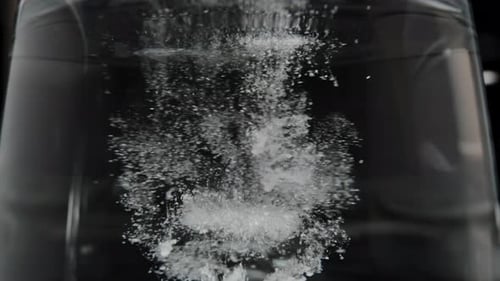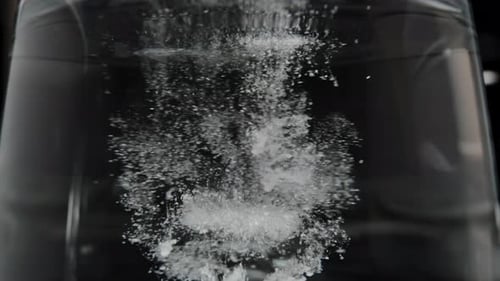
Maximize Your Results with Creatine: Discover the Ideal Hydration Strategy
The Creatine-Hydration Connection
Creatine, a naturally occurring compound in our muscles, plays a vital role in energy production during high-intensity, short-duration activities. When we supplement with creatine, we're essentially supercharging our muscles' energy reserves. Contrary to popular belief, creatine doesn't cause dehydration. In fact, it's quite the opposite. Creatine supplementation increases water retention, primarily within muscle cells. This intracellular hydration is a key factor in creatine's effectiveness, contributing to improved muscle function, recovery, and even thermoregulation.
How Much Water Should You Drink with Creatine?
The amount of water you should drink when taking creatine depends on several factors:
-
Per Dose: With each 5-gram dose of creatine, aim to drink at least 8-12 ounces (240-375 mL) of water.
-
Daily Intake: Consume 3 to 4 liters (12 to 16 cups) of water per day when taking creatine.
-
Personalized Approach: Drink half your body weight in ounces of water daily. For instance, if you weigh 150 pounds, aim for about 75 ounces (roughly 9.5 cups) of water.
-
During Intense Training: If you're in a creatine-loading phase or engaging in intense workouts, you might need to add an extra 2-2.5 liters (8-10 cups) to your daily routine.
:max_bytes(150000):strip_icc()/Recommended-Water-Intake-for-Athletes-During-Exercise-PrimaryV2-54d46f2253584bfdb5d17a2badb1018a.png)
Remember, these are general guidelines. Your individual needs may vary based on factors like body weight, activity level, and climate.
Hydration's Impact on Creatine Efficacy
Proper hydration is essential for maximizing creatine's benefits:
-
Enhanced Absorption: Adequate hydration ensures optimal absorption of creatine in your digestive system.
-
Improved Muscle Function: The increased intracellular water content supports better muscle performance and recovery.
-
Thermoregulation: Proper hydration, combined with creatine's effects, can improve your body's ability to regulate temperature during exercise.
-
Overall Performance: When you're well-hydrated, you're better equipped to utilize creatine's ergogenic effects, such as improved muscle power, strength, and endurance.
The Perils of Inadequate Hydration
While creatine itself doesn't cause dehydration, failing to increase your water intake when using creatine can lead to some unpleasant side effects:
-
Dehydration Symptoms: Feeling excessively thirsty or hot, inability to urinate, heavy sweating, or hot and dry skin.
-
Electrolyte Imbalance: This can manifest as dry mouth, increased thirst, drowsiness, confusion, nausea, muscle pain, rapid heart rate, or even fainting.
-
Muscle Cramps and Heat Intolerance: Inadequate hydration can increase the risk of muscle cramps and reduce your ability to tolerate heat.
-
Serious Side Effects: In severe cases, dehydration can lead to trouble breathing, swelling, and rapid weight gain, requiring immediate medical attention.
Creatine Forms and Hydration Needs
Not all creatine is created equal when it comes to hydration needs. The two most common forms, creatine monohydrate and creatine HCl (hydrochloride), have different effects on water retention:
Creatine Monohydrate:
- Increases water retention in muscle cells
- Requires more additional hydration (12-16 ounces per 5-gram dose)
- Supports cell-volumizing effect

Creatine HCl:
- Has lower water retention effects
- Doesn't typically require the same level of additional hydration
- More balanced option in terms of hydration needs
Understanding these differences can help you choose the form that best fits your hydration preferences and lifestyle.
Hydration Strategies for Different Athletes
Whether you're a marathon runner or a powerlifter, your hydration needs while using creatine will vary:
Endurance Athletes:
- Need to counterbalance fluid loss during prolonged exercise
- May benefit from creatine's hyperhydration effect for better thermoregulation
- Should focus on consistent hydration before, during, and after long training sessions
Strength Training Athletes:
- Engage in high-intensity, shorter-duration workouts
- May require higher overall daily water intake (3-4 liters)
- Should focus on hydration to support the cell-volumizing effect of creatine
Regardless of your athletic focus, always drink at least 12 ounces (375 mL) of water with each 5-gram dose of creatine.
Environmental Factors and Creatine Hydration
Your environment plays a crucial role in determining your hydration needs when using creatine:
Hot and Humid Climates:
- Increase water intake to compensate for higher fluid loss through sweat
- Aim for 7-10 ounces (207-295 mL) of water every 10-20 minutes during intense exercise
- Focus on post-workout hydration for recovery and muscle growth
Creatine's Role in Thermoregulation:
- Aids in heat dissipation by promoting hydration
- Can improve sweat composition and rate, enhancing evaporative cooling
- Helps maintain performance in challenging environmental conditions
Remember to balance your water intake based on creatine use, activity level, and environmental conditions to avoid overhydration, which can lead to hyponatremia (low sodium levels).
The Latest Scientific Findings
Recent research has debunked several myths about creatine and hydration:
-
No Dehydration or Cramping: Contrary to popular belief, creatine does not cause dehydration or muscle cramps. In fact, studies show it may reduce the incidence of cramps and heat-related issues.
-
Improved Thermoregulation: Athletes using creatine have shown better thermoregulatory responses during exercise in hot and humid conditions.
-
Enhanced Overall Hydration: Creatine users often demonstrate improved total body, extracellular, and intracellular water volumes compared to non-users.
-
Performance Benefits: The increased intracellular hydration from creatine use supports better muscle function, recovery, and overall athletic performance.
Maximizing Your Creatine and Hydration Strategy
To get the most out of your creatine supplementation while maintaining optimal hydration:
-
Stay Consistent: Aim for 3-4 liters of water daily, adjusting based on your activity level and environment.
-
Time It Right: Hydrate before, during, and after workouts to support creatine's effects and overall performance.
-
Listen to Your Body: Monitor urine color, thirst levels, and physical signs to gauge your hydration status.
-
Consider Your Environment: Increase water intake in hot or humid conditions to support creatine's benefits and prevent heat-related issues.
-
Choose Wisely: Select a creatine form that aligns with your hydration preferences and lifestyle.
-
Balance Electrolytes: Consider incorporating electrolyte-rich foods or supplements to maintain proper fluid balance.
By understanding the intricate relationship between creatine and hydration, you can unlock the full potential of this powerful supplement. Remember, proper hydration is not just about drinking water; it's about creating an optimal internal environment for creatine to work its magic. With these strategies in hand, you're well-equipped to maximize your results and take your athletic performance to new heights. Stay hydrated, stay strong, and let creatine fuel your journey to peak performance.
What is the relationship between creatine and hydration?
Creatine actually increases water retention in muscle cells, which is essential for its effectiveness. Proper hydration enhances creatine absorption and muscle function.
How much water should I drink when taking creatine?
Aim for at least 8-12 ounces of water per 5-gram dose of creatine, and try to consume 3-4 liters of water daily.
Can I get dehydrated while using creatine?
Creatine itself doesn't cause dehydration, but not increasing your water intake can lead to dehydration symptoms.
What are the signs of dehydration when using creatine?
Signs include excessive thirst, inability to urinate, muscle cramps, and heavy sweating. Severe cases can lead to more serious issues.
Are there different types of creatine that affect hydration needs?
Yes! Creatine monohydrate increases water retention and requires more hydration, while creatine HCl has lower water retention effects.
How does hydration affect athletic performance with creatine?
Proper hydration boosts creatine's benefits, improving muscle performance, recovery, and thermoregulation during workouts.
Do I need more water in hot and humid conditions when using creatine?
Absolutely! In those conditions, increase your water intake to compensate for fluid loss and support performance.
Should athletes focus on hydration differently based on their sport?
Yes! Endurance athletes need consistent hydration to counterbalance fluid loss, while strength trainers should maintain high overall daily water intake.
What should I monitor to ensure I'm properly hydrated while using creatine?
Keep an eye on urine color, thirst levels, and any physical signs of dehydration to gauge your hydration status.
How can I maximize my results with creatine and hydration?
Stay consistent with your water intake, hydrate around workouts, listen to your body, and choose the right creatine form for your needs.
